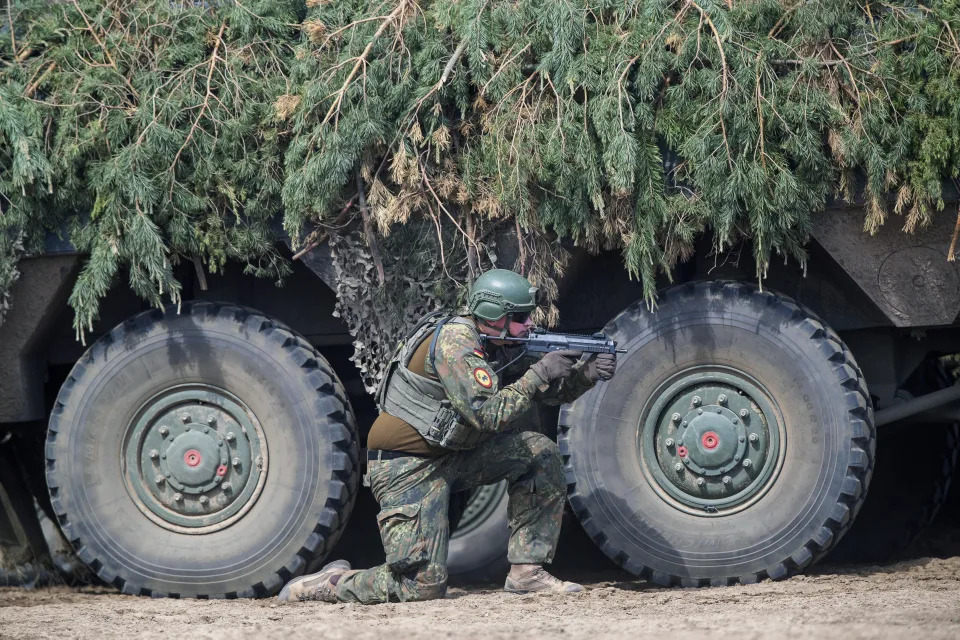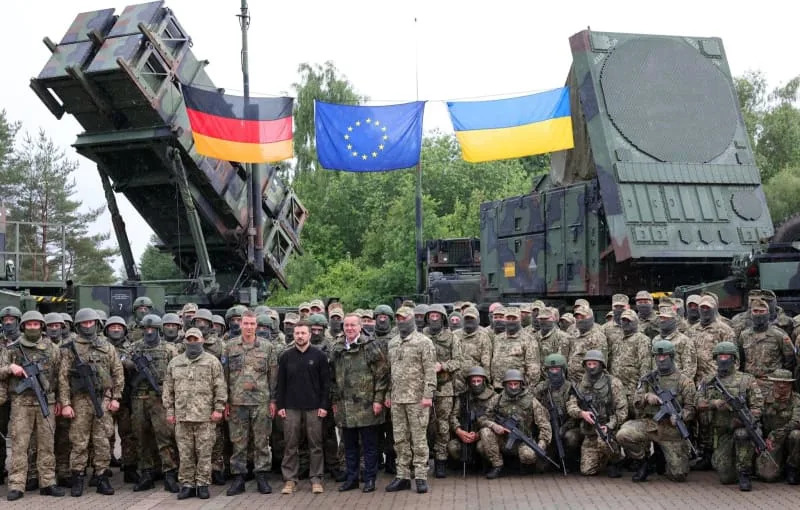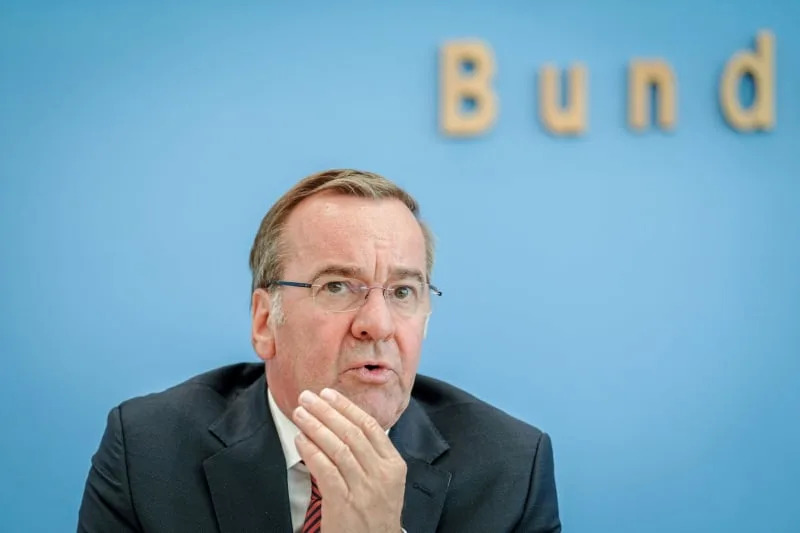DEUTCHE DRAFT
WHAT ABOUT WOMEN?!
KIRSTEN GRIESHABER
Wed, June 12, 2024 a

- German soldiers take part in the Lithuanian-German division-level international military exercise 'Grand Quadriga 2024' at a training range in Pabrade, north of the capital Vilnius, Lithuania on Wednesday, May 29, 2024. Germany’s defense minister is lobbying for legislation that would help refill the depleted ranks of the armed forces to bolster the country's defense capabilities.
(AP Photo/Mindaugas Kulbis, File)
BERLIN (AP) — Germany's defense minister announced on Wednesday plans for new legislation that would help refill the depleted ranks of the armed forces to bolster the country's defense capabilities.
Boris Pistorius said the proposed bill would allow the government to send letters to all young men who turn 18 — about 400,000 every year — asking about their willingness and ability to serve in the military.
Under the law, those who receive the letter would have to fill out the questions. The army would then invite those interested in serving for a medical checkup and choose the most qualified to serve in the military for a period of 6-23 months.
Speaking to reporters in Berlin, Pistorius explained that the threat levels have changed from what they were a few years ago.
“Russia has now been waging a war against Ukraine for two and a half years — it is not only calling the rules-based international order into question, it is destroying it," he said. “This is a new threat situation.”
The campaign is part of efforts to boost active forces numbers to 203,000 from the current just under 181,000 figure. Germany had over 500,000 troops during the Cold War.
If the bill passes, the new military service would still be voluntary and a far cry from compulsory conscription for young men, which was suspended in Germany in 2011, after 55 years. Since then, there has been no mandatory military and civilian service in the country.
Germany’s conscription act still stipulates that compulsory military service for men can be revived if the parliament declares a state of emergency for defense.
Women who turn 18 would also receive the letters, Pistorius said, but would not be obliged to answer, since Germany's constitution does not foresee mandatory service for them.
After Russia launched its full-scale invasion of Ukraine in 2022, leading to one of most brutal wars in Europe since World War II, calls have steadily grown in Germany to reintroduce some kind of military service to be better prepared for possible future wars.
Only days after Russia attacked Ukraine, German Chancellor Olaf Scholz pledged to increase Germany’s defense spending to a NATO target of 2% of gross domestic product and set up the 100 billion-euro ($107 billion) special fund. He said that the invasion marked a “turning point.”
Pistorius himself has repeatedly said that Germany must become “fit for war” in order to be able to act as a credible deterrent together with its NATO allies.
If the proposal becomes law, Pistorius expects that of the about 400,000 young men who fill out the questionnaire each year, around a quarter would express an interest in serving in the military. Of those, the army is likely to choose 5,000 most qualified men but hopes to increase that number in the long-term.
Germany's lack of military personnel and equipment is a known problem. In March, the parliament's commissioner for the armed forces said in her annual report that Germany’s military still has “too little of everything.”
“The Bundeswehr is aging and shrinking,” Eva Hoegl said and acknowledged at the time that “the issue of personnel has very clearly arrived on the political agenda.”
In the face of perceived growing threats by Russia, other European countries are also considering new forms of military service.
In Britain, the governing Conservative Party said in May that all 18-year-olds in the country would have to perform a year of mandatory military or civilian national service if it wins the July 4 national election.
BERLIN (AP) — Germany's defense minister announced on Wednesday plans for new legislation that would help refill the depleted ranks of the armed forces to bolster the country's defense capabilities.
Boris Pistorius said the proposed bill would allow the government to send letters to all young men who turn 18 — about 400,000 every year — asking about their willingness and ability to serve in the military.
Under the law, those who receive the letter would have to fill out the questions. The army would then invite those interested in serving for a medical checkup and choose the most qualified to serve in the military for a period of 6-23 months.
Speaking to reporters in Berlin, Pistorius explained that the threat levels have changed from what they were a few years ago.
“Russia has now been waging a war against Ukraine for two and a half years — it is not only calling the rules-based international order into question, it is destroying it," he said. “This is a new threat situation.”
The campaign is part of efforts to boost active forces numbers to 203,000 from the current just under 181,000 figure. Germany had over 500,000 troops during the Cold War.
If the bill passes, the new military service would still be voluntary and a far cry from compulsory conscription for young men, which was suspended in Germany in 2011, after 55 years. Since then, there has been no mandatory military and civilian service in the country.
Germany’s conscription act still stipulates that compulsory military service for men can be revived if the parliament declares a state of emergency for defense.
Women who turn 18 would also receive the letters, Pistorius said, but would not be obliged to answer, since Germany's constitution does not foresee mandatory service for them.
After Russia launched its full-scale invasion of Ukraine in 2022, leading to one of most brutal wars in Europe since World War II, calls have steadily grown in Germany to reintroduce some kind of military service to be better prepared for possible future wars.
Only days after Russia attacked Ukraine, German Chancellor Olaf Scholz pledged to increase Germany’s defense spending to a NATO target of 2% of gross domestic product and set up the 100 billion-euro ($107 billion) special fund. He said that the invasion marked a “turning point.”
Pistorius himself has repeatedly said that Germany must become “fit for war” in order to be able to act as a credible deterrent together with its NATO allies.
If the proposal becomes law, Pistorius expects that of the about 400,000 young men who fill out the questionnaire each year, around a quarter would express an interest in serving in the military. Of those, the army is likely to choose 5,000 most qualified men but hopes to increase that number in the long-term.
Germany's lack of military personnel and equipment is a known problem. In March, the parliament's commissioner for the armed forces said in her annual report that Germany’s military still has “too little of everything.”
“The Bundeswehr is aging and shrinking,” Eva Hoegl said and acknowledged at the time that “the issue of personnel has very clearly arrived on the political agenda.”
In the face of perceived growing threats by Russia, other European countries are also considering new forms of military service.
In Britain, the governing Conservative Party said in May that all 18-year-olds in the country would have to perform a year of mandatory military or civilian national service if it wins the July 4 national election.
German defence minister proposes 'selective' military service system
DPA
Wed, June 12, 2024

German Minister of Defense Boris Pistorius and Ukrainian President Volodymyr Zelensky soldiers in front of "Patriot" anti-aircraft missile systems during their visit to a military training area. Jens Büttner/dpa
German Defence Minister Boris Pistorius on Wednesday proposed that the country require young men to register for potential military service, in a move that comes 13 years after Germany effectively abolished national conscription.
The step would not reinstate conscription. Pistorius instead stressed that he anticipates using the registration questionnaires to see who might have interest in voluntarily doing service with Germany's military, known as the Bundeswehr.
Pistorius described the idea as "selective military service," designed to allow the military to call up only "the fittest, most suitable and most motivated" for training.
Young men would be required to fill out the questionnaires, but young women would also be given copies and be asked to voluntarily submit the form as well, Pistorius said at a news conference on Wednesday afternoon.
Pistorius said that's because the military service requirement, which remains in Germany's constitution, applies only to men.
Around 40,000 expected to be mustered
Pistorius said that military planners estimate that 400,000 people will have to complete the planned questionnaire each year, and about a quarter of the men could express an interest in entering the military.
Some 40,000 candidates could then take part in the physical check-up. That call-up would be mandatory for those who receive it, but Pistorius stressed that he anticipates only summoning those who indicate a voluntary interest.
"We don't want a boring, meaningless military service," Pistorius said. "But rather a military service that is meaningful and makes sense."
There is currently capacity to train between 5,000 to 7,000 recruits, but this is set to grow. The military service is expected to last six or 12 months.
The proposal represents a first step towards potentially reinstating some form of mandatory military service, a controversial issue in Germany, and would require a change to the military service law.
Pistorius stressed on Wednesday that no one would be forced to serve in the military against their will or beliefs: "Of course people will have the right to refuse military service. That remains unchanged."
Military struggling to recruit
Germany effectively abolished conscription in 2011 after 55 years, with a system that also generally allowed men to opt out of the military and do civilian service instead.
Although many of the institutions and facilities for the conscription system have since been dismantled, the country's law continues to allow for mandatory service in the event of war or other tensions.
The Bundeswehr has struggled to recruit enough volunteers to fill the ranks, and last year shrank to 181,500 soldiers despite new efforts to attract volunteers.
Russia's full-scale invasion of Ukraine has put the military's shortfalls into renewed focus, and Chancellor Olaf Scholz has pledged to rebuild the armed forces.
Adding more recruits is intended to help make the army "war-ready," as Pistorius describes it.
Pistorius commissioned studies of various models of compulsory service ahead of Wednesday's announcement.
Mixed reaction from politicians
The proposal met with a mixed response from leading German politicians in parliament. The idea of bringing back compulsory military service is very controversial in the country.
Some lawmakers welcomed the proposal as a useful idea to address military manpower shortages, even as many expressed hesitation over the mandatory elements.
Florian Hahn of the centre-right CDU/CSU opposition bloc said he expected Pistorius to unveil more far-reaching plans that may have included actually bringing back compulsory service, and suspected that Scholz and the coalition had "let him run out of steam" during a nine-month review of the issue.
Dirk Vöpel, who like Pistorius is a member of Scholz's Social Democrats (SPD), expressed support for Pistorius' proposal.
"In case of defence, we need a stronger reserve," he said, adding that it's now crucial to "revive structures that have been completely destroyed with the suspension of compulsory military service."
Vöpel, however, did not comment specifically on the compulsory questionnaires and a physical examinations proposed by Pistorius, which are controversial within the SPD.
"Regardless of what the legal requirements will look like in concrete terms, the aim must be to recruit significantly more young men and women to serve in the Bundeswehr than before," he said.
Sara Nanni of the Greens said her party was prepared to engage constructively with the proposal, even if there were still many unanswered questions. She said Germany needs an impetus that tells young people "your country needs you," but said the mandatory elements raise legal and social questions.
Alexander Müller of the free-market liberal Free Democrats (FDP) called it an interesting concept but remained uncommitted. He said a light version of compulsory service would be difficult for his party to back.
Rüdiger Lucassen of the far-right Alternative for Germany (AfD), meanwhile, dismissed the proposal as insufficient while also accusing Pistorius of escalating tensions with Russia.
"It puts our entire population in turmoil, because of course it clearly creates a mood of war, which he [Pistorius] also feeds by saying that the Russian Federation and [Russian President Vladimir] Putin would be ready to attack in 2029," said Lucassen.

German Minister of Defense Boris Pistorius presents plans for a new form of military service at a press conference. Kay Nietfeld/dpa
Germany Unveils Plan to Plug Yawning Shortage in Troop Numbers
Arne Delfs
Wed, June 12, 2024
(Bloomberg) -- Germany presented proposals to help address a shortage of armed-forces personnel that relies on recruits volunteering for service, part of a drive to expand the military triggered by Russia’s war on Ukraine.
Defense Minister Boris Pistorius had suggested attempting to plug the shortfall of regular troops of around 20,000 with a reintroduction of some form of conscription. Chancellor Olaf Scholz was among senior figures in the government to push back, saying its abolition in 2011 shouldn’t be reversed, even with an increased threat of Kremlin aggression.
“The threat situation is a completely different one compared with a few years ago,” Pistorius said Wednesday at a news conference in Berlin.
Russian President Vladimir Putin has unleashed a massive increase in defense spending and is effectively operating a war economy, while verbal attacks on NATO members are increasing, Pistorius added.
“We must assume that Russia will be able from 2029 onwards to attack a NATO member or a neighbor,” he said.
The proposed model would oblige young men to fill out a questionnaire about their health and basic motivation — completing the form would be voluntary for young women. A number of respondents would then be asked to volunteer for a basic training of six months with an option to extend that by 17 months.
That would enable the armed forces, or Bundeswehr, to recruit an additional 5,000 troops per year, on top of the 10,000 volunteers currently, according to a paper distributed by the defense ministry.
The Bundeswehr has long suffered from a shortfall in personnel and last year shrank to about 180,000 regular troops despite sustained efforts to attract volunteers.
To fulfill its obligations as a member of NATO, Germany will need a total of about 460,000 personnel, the ministry estimates. Of those, around 200,000 would be active troops and the rest reserves.
Germany abolished compulsory military or civil service for men in 2011 under former Chancellor Angela Merkel, though German law still provides for possible conscription in the event of war or other conflict.
Immediately after Russia’s full-scale invasion of Ukraine in February 2022, Scholz proclaimed a “turning point” in German military and security policy.
A key element was the establishment of a debt-financed €100 billion ($108 billion) fund for investment in the Bundeswehr to help reverse years of neglect.
No comments:
Post a Comment